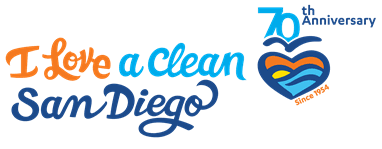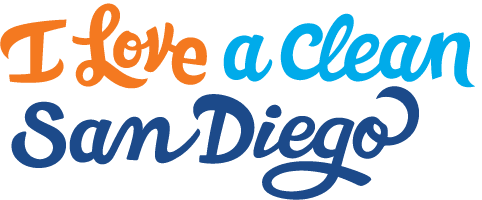Our interactive presentation encourages students to be leaders in their communities by helping them learn what they can do to have a positive impact on their local environment. We use a hands-on Enviroscape watershed model to discuss storm water pollution, where it comes from, and what we can do to prevent pollutants from entering our waterways. Students discover how pollution affects our local ecosystems as it enters our rivers through storm drains and flows towards the San Diego Bay and Pacific Ocean.
The Recycling presentation acts as an introduction to the environment, recycling, household hazardous waste, composting, and organic waste recycling. The students will get a chance to understand the importance of reducing waste by practicing the model of reduce, reuse, and recycle. Throughout the presentation, the students will put their new knowledge into action through an interactive waste sorting activity. They will leave understanding the power of their small daily actions on the health of San Diego.
In this presentation, students discuss the water, labor, energy, and other resources that go into making and transporting food. They will learn about the importance of a circular economy in reducing waste. We brainstorm solutions to reduce food waste and play a hands on game to emphasize how they can apply this in their everyday lives. Students will go home with challenge cards to inspire action that minimizes food waste in San Diego!
Students will discover how pollution affects our local watersheds as it enters our rivers through storm drains and flows toward the Pacific Ocean. They will learn the important, yet delicate balance in an ecosystem as we discuss the relationship between sea otters, sea urchins, and kelp. We cover food webs, resource conservation, and human impacts on fragile ecosystems. Students will leave with challenge cards inspiring small actions to keep our environment and waterways clean. This presentation is very interactive with students participating in a game utilizing the information they learned earlier!
Our program focuses on waste reduction, recycling, and the art of repurposing items. The “Reuse Program” is broken into two segments:
The first segment involves a 15-minute presentation that investigates important concepts such as the health of our environment, the negative impacts of litter in the environment, and how litter travels throughout San Diego’s watersheds. We will identify solutions to these issues by talking about the model of reduce, reuse, and recycle and zero waste.
Following the presentation, students will be given the chance to create their own items by repurposing old objects like scrap ribbon, bottles caps, cereal boxes, toilet paper tubes and more! This activity allows students to creatively expand their perspective of common objects and think about how to reuse and repurpose items in an effort to make less waste!
This presentation will increase students’ knowledge of local watersheds and promote behaviors that prevent stormwater pollution. We also identify important topics including the water cycle, food webs, and the latest update on the Pacific Garbage Patch. Students will be given the chance to work in a small group to closely examine a particular pollutant in a jar and report their findings to the class. At the program's conclusion, students recognize everyday actions they can take to keep their local watershed healthy.
This presentation will increase students’ knowledge of local watersheds and promote behaviors that prevent stormwater pollution. We also identify important topics including the water cycle, food webs, and the latest update on the Pacific Garbage Patch. Students will rotate in small groups between ipad stations to closely examine and learn more about different types of pollutants. In conclusion of the program, we help the students recognize everyday actions they can take to keep their local watershed healthy. This program is approximately 1 hour in length and geared for high school Biology, Earth Science, and APES classes; however, we are flexible and always willing to look into visiting other applicable classrooms.
“No Time to Waste” covers waste reduction, resource conservation, and linear vs circular systems. Students discuss the hidden costs and impacts behind common items and are introduced to the idea of zero waste living. This interactive presentation encourages students to be leaders in their communities by helping them discover small daily actions they can take to prevent unnecessary waste and have a positive impact on their environment. The students will be empowered to adopt a greater level of environmental responsibility and become environmental leaders for their peers.
“Cooking Up Change” covers food waste reduction, resource conservation and regional organics legislation. Students consider the hidden resource costs of food production and the consequential pollutants that enter our waterways and atmosphere. By completing an interactive activity, students brainstorm creative solutions for cooking with food scraps and unusual ingredients. Encouraging students to be leaders in their communities, we help them discover their potential as consumers and identify small daily actions to minimize food waste and have a positive impact on their environment.
Our program explores ocean acidification and its impacts on marine ecosystems and food chains through two presentations over two days. We identify the chemical processes behind ocean acidification and sources contributing to this issue. Students will also have the opportunity to look at plankton specimens under a microscope and discuss the impacts that ocean acidification is having on specific plankton species. This program is geared for high school Biology, Chemistry and APES classes; however, we are flexible and always willing to look into visiting other applicable classrooms.

